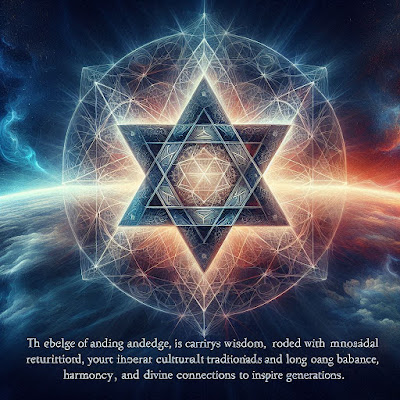Introversion and Spirituality: The Quiet Path to Inner Wisdom
- Get link
- X
- Other Apps
Introversion and Spirituality: The Quiet Path to Inner Wisdom
Introversion is often seen as a personality trait rooted in solitude, reflection, and deep thinking. But when combined with intuition, it creates a powerful synergy that can lead to profound spiritual insight. For introverts, spirituality is not just about religious practice—it's about a deeper connection to one's inner self, the universe, and something greater than oneself.
Introversion naturally lends itself to spiritual growth because introverts tend to find solace and clarity in quiet, solitary moments. In a world that often demands external engagement, introverts are more likely to find peace and meaning in introspection. Spirituality, with its emphasis on inner peace, self-awareness, and connection to the divine, becomes a natural path for those who value solitude and reflection.
1. The Quiet Reflection of the Spiritual Seeker
Introverts are drawn to quiet, contemplative spaces—whether it’s a cozy corner of a room, a walk through nature, or a moment of solitude. These moments of reflection create the perfect environment for spiritual growth. Many spiritual practices require deep introspection—meditation, prayer, and contemplation are just a few examples where silence and solitude are essential. Introverts are well-equipped for these practices because they naturally feel comfortable in their own company, allowing them to connect with their inner world and higher consciousness.
The act of going inward is central to spiritual awakening. Whether it's through journaling, mindfulness, or simply sitting in silence, introverts embrace the opportunity to look within, search for meaning, and listen to the quiet voice of intuition.
2. Intuition as a Spiritual Compass
Introverts often have a strong intuitive sense. They are deeply in tune with their inner world and trust their gut feelings to guide them. This intuitive insight is a powerful tool in spiritual practice, helping them discern truth and follow a path that aligns with their highest self.
Intuition connects the conscious mind to the deeper, spiritual realms. When introverts rely on their inner guidance, they feel a sense of connection to something greater—whether it’s a universal force, the divine, or simply the deeper layers of their own consciousness. This ability to listen to their inner voice makes them more receptive to spiritual insights and experiences.
3. Spiritual Practices in Solitude
Many spiritual traditions emphasize the importance of solitude for personal growth and connection to the divine. Think of the many monks, mystics, and spiritual leaders throughout history who spent time in solitude, meditating, praying, and reflecting on their spiritual journey. For introverts, this solitary pursuit is a natural fit. Whether it’s a long walk in nature or a quiet evening of journaling, the introverted individual finds peace and spiritual connection in the stillness of their own mind.
These moments of solitude allow them to tune out the distractions of the outside world and tune into something far more profound. In this space, they can connect with their intuition, practice mindfulness, and cultivate a sense of divine presence or universal truth.
4. The Deep Spiritual Connection
Introverts don’t always need external validation or communal approval to feel spiritually connected. They experience spirituality in quiet, personal ways—through deep reflection, internal guidance, and the quiet moments of grace that occur in their everyday lives. This doesn’t mean they are isolated or disconnected from others; it means their spirituality is often deeply personal, unspoken, and lived in the stillness.
In their relationships, introverts may express spiritual warmth by offering their authentic selves in meaningful ways. Their inner strength and understanding, cultivated through introspection, allow them to connect with others on a deep, soulful level, even if they don’t engage in large social settings.
5. Literature and Spirituality: A Reflection of the Inner World
The connection between introversion and spirituality is often beautifully explored in literature. Writers have long depicted introverted characters whose spiritual journeys unfold through solitude and introspection.
Characters like Virginia Woolf’s Mrs. Dalloway or J.R.R. Tolkien’s Frodo Baggins exemplify introverts who are on spiritual journeys of self-discovery, finding meaning and purpose through their quiet reflections. These characters provide a window into the introverted spiritual seeker—someone who might not be outwardly expressive but is deeply in touch with their inner world and intuitive wisdom.
In these stories, moments of solitude become opportunities for profound spiritual realization, allowing the characters to connect with the divine, find their inner strength, or discover new layers of meaning in their lives.
Conclusion: A Quiet Path to Spiritual Awakening
Introversion and spirituality often go hand in hand. For introverts, the journey inward is not a burden but a sacred opportunity to connect with the divine, cultivate inner peace, and discover personal truth. Their natural inclination toward solitude and self-reflection provides fertile ground for spiritual growth.
With intuition as their guide, introverts often find spiritual enlightenment in quiet, subtle moments—whether it’s through meditation, nature walks, or simply being still in their own thoughts. By embracing their introspective nature, introverts can cultivate a deep, authentic spiritual life that aligns with their highest self and connects them to the world around them in meaningful ways.
In a world that often values outward expression, introverts show us the power of stillness, inner knowing, and the quiet path to spiritual awakening.
Image Description: An introverted character sits quietly by a window, gazing out at the natural world. The soft glow of morning light reflects the peace and introspection they carry within. In the background, a journal and cup of tea hint at a deeper, quiet reflection on their spiritual journey.
Further Reading:
- "The Power of Solitude" by J.D. Salinger (on how solitude can lead to spiritual growth and understanding).
- "The Art of Stillness" by Pico Iyer (explores the deep spiritual insights found in solitude).
- "The Mystic Path" by Evelyn Underhill (examines the connection between mysticism, introversion, and spiritual awakening).
- Get link
- X
- Other Apps




Comments
Post a Comment